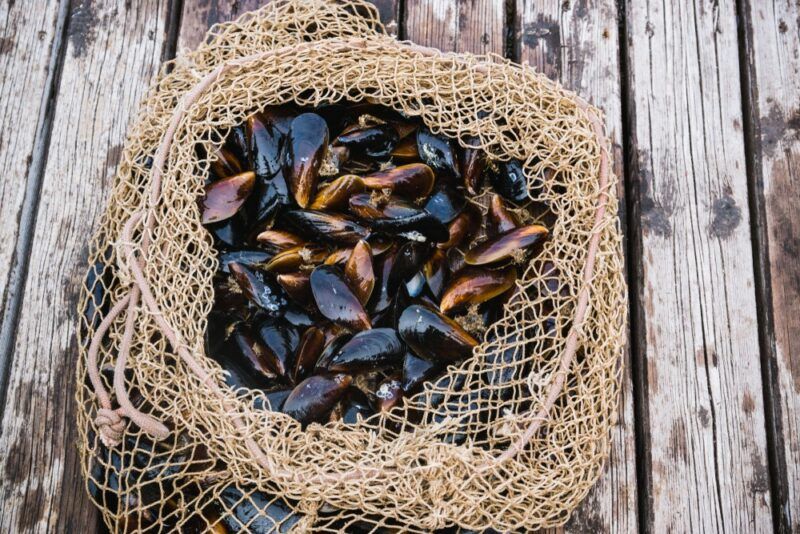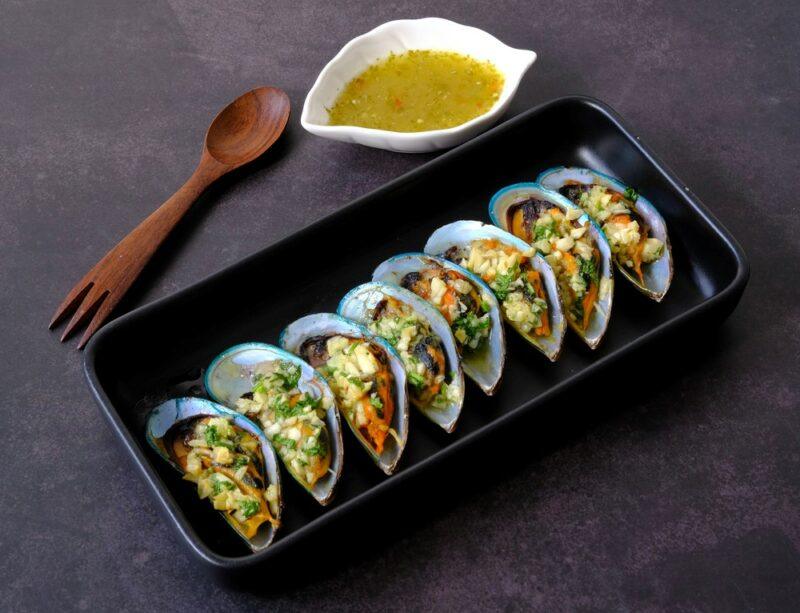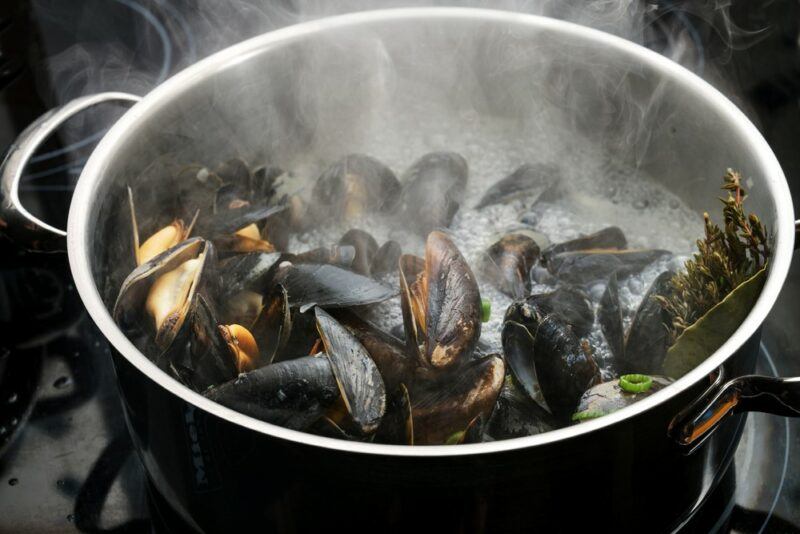
Mussels are a delicious delicacy. Whether you order them at restaurants, only enjoy them during special events, or prepare them at home, the subtle almost sweet flavor and chewy texture is too good to miss. Most seafood is pretty healthy, but are mussels good for you?
They’re easy to find too. These days you can even buy them online, which is perfect for when you want to treat yourself.
Mussels offer plenty of potential benefits too. After all, seafood is always filled with powerful nutrients and omega 3 fatty acids. The nutrients alone help to boost your health.
Still, there are some concerning features to think about too, including the risk of contamination and food poisoning. So then, are mussels good for you? To answer that question, we need to closely look at where mussels shine and what their problems are.
Are Mussels Good For You?
- The Features Of Mussels
- How Mussels Can Improve Your Health
- How Mussels Could Be Harmful
- Can You Eat Mussels On A Keto Diet?
- Are Raw Mussels Safe?
- Should You Be Eating Mussels?
- Are Mussels Better Than Oysters?
- Final Thoughts
The Features Of Mussels

An Excellent Source Of Protein
Seafood often provides a decent amount of protein. Mussels are no exception. You get around 24 grams of protein in a single 3.5 ounce serving size.
Protein is crucial. There’s no getting around that. It provides us with essential amino acids our bodies use to create the proteins we rely on.
Mussels are useful here. As a type of seafood, they naturally give you all the amino acids that your body needs each day (in other words, mussels are a complete protein).
They Provide Omega 3 Fatty Acids
Like other types of seafood, mussels contain omega 3 fatty acids. Omega 3s have been extensively researched and linked to many different health benefits. They’re even famous for their health effects.
They may be particularly relevant these days, as modern diets are heavy in a different type of polyunsaturated fatty acid – omega 6. Omega 3 and omega 6 are both healthy and provide benefits, but they work best when your omega 6 intake isn’t too high.
Estimates of the ideal omega 3 to omega 6 ratio range from 1:1 to 1:4. Yet, many of us end up with a ratio of 1:10 or even worse.
Eating mussels regularly can help with this omega 3 to omega 6 ratio, while giving you access to all the other benefits of omega 3s as well.
They’re Low In Mercury
Mercury is a serious issue with seafood, as it can lead to developmental issues for children and babies, along with some serious health problems for adults too.
Low mercury seafood is an easy way to get the benefits of seafood, while minimizing your risk. Mussels are excellent here, as they’re naturally low in mercury.
That said, you’ll still need to watch your serving sizes and stick to the recommended two or three servings of seafood per week. We’ll come back to the reason for doing later on.
They Provide Many Nutrients
You’re also getting plenty of important nutrients with mussels, such as zinc, iron, vitamin B12, and vitamin A.
We don’t need to spell out why nutrients are so important, right? These play vital roles in processes throughout our bodies. We wouldn’t be able to function without them.
While there are plenty of sources of nutrients, it’s still easy to end up with low levels of one or more essential nutrients. Foods like mussels are an easy way to boost your nutrient intake and protect your health in the process.
Some of the nutrients are even present in exceptional levels, with a serving of mussels giving you more than your daily needs for vitamin B12, manganese, and selenium.
They’re Unprocessed

Modern diets are packed full of processed foods, ones that contain plenty of additives, including some artificial ones. Natural foods tend to be much better for our health and mussels fit that bill nicely.
How Mussels Can Improve Your Health
Could Help With Weight Loss
While mussels aren’t a traditional weight loss food, they can still be helpful. After all, they offer a decent amount of protein and they’re low in calories. Those features are ideal, meaning that the mussels should help to keep you satisfied.
To get the most benefits, you’ll need to be cautious about how you prepare the mussels. Focus on approaches that don’t add extra calories, such as steaming the mussels and using herbs and spices for seasoning.
Be particularly cautious with any cream or butter-based sauce, as these will dramatically increase the calorie content of your meal.
Good For Your Brain
Mussels are fantastic for your brain function as well. This effect largely comes from the omega 3 fatty acids. These healthy fats are famous for their ability to improve mental functioning and boost mood. They could even be relevant for mental health, helping people with depression or anxiety to recover and decreasing the risk of those conditions to begin with.
Omega 3s can even help to slow down cognitive decline, which is a powerful outcome. There’s even the chance that omega 3s reduce the risk of dementia, although research is yet to prove this outcome.
Some of the nutrients in mussels are relevant to your brain health too, including vitamin B12. Being deficient in B12 could lead to a host of problems, including memory loss and increased dementia risk.
As such, getting enough vitamin B12 is an essential way to keep your brain healthy. Mussels aren’t the only source of vitamin B12, but they are a powerful one.
Reduce The Risk Of Anemia

Anemia occurs when your body isn’t producing enough red blood cells. The shortage of red blood cells makes your body less effective at transporting oxygen, leading to symptoms like fatigue, weakness, cold hands and feet, and lightheadedness.
Anemia from iron deficiency is surprisingly common in the United States. Many people simply need to be consuming more iron. Mussels are an easy way to do so.
May Be Good For Your Heart
Mussels have some properties that help with your heart, including the omega 3 fatty acids. These fats may help to decrease cholesterol levels and promote a healthy heart rhythm. They’re also much better for you than saturated fat.
However, this heart health effect isn’t clear cut. As we’ll discuss shortly, mussels do contain a decent amount of sodium and cholesterol – features that are less appealing for your heart.
Because of this, anyone concerned about their heart health should talk to their doctor, to see whether mussels are likely to help or cause harm.
Can Help With Your Immune System
The nutrients in mussels are relevant to your immune system too, helping to make sure that your body can fight off infection well.
The zinc is particularly relevant here. This mineral is a critical part of your immune response and being deficient in it can even make your immune system less effective.
Some of the other nutrients could be relevant too, especially if they help you to avoid deficiencies. After all, any nutrient deficiency makes it harder for your body to function well.
How Mussels Could Be Harmful
Their Sodium Content
Sodium is an essential electrolyte. It’s also something to watch out for, as modern diets are packed with sodium and many of us get more than we need.
Sodium isn’t just found in processed foods either. Some natural foods are surprisingly high in sodium too, particularly shellfish.
For mussels, you might be getting roughly 370 mg of sodium in a 3.5 ounce serving. That’s a decent amount, especially if you’re trying for less than 1,500 mg of sodium per day.
That sodium figure only applies to mussels themselves. Some sauces will add extra sodium too, particularly tomato-based sauces.
If you’re worried about sodium, you may need to pay close attention to how many mussels you eat at a time. Or, better yet, focus on fresh fish rather than mussels. Fish gives you many of the same benefits, but it’s naturally lower in sodium.
They Can Be Contaminated

Contamination is a serious risk with seafood – as our oceans aren’t clean. Common contaminants include heavy metals like lead and mercury, industrial chemicals, and pesticides.
Each contaminant could easily cause harm, especially if you’re consuming them regularly. This is one reason we’re told to stick to two or three servings of seafood a week.
Mussels are especially concerning as they’re filter feeders. They’re at particular risk of contamination by microplastics. It’s not clear what this contamination means for human health, but who wants to be eating plastic?
The risk of contamination is particularly high during summer, so mussels harvested in this season are more likely to make you sick. That said, buying mussels in the cooler months only reduces the risk. It’s always possible to get sick from mussels, regardless of when they were harvested.
Can You Eat Mussels On A Keto Diet?
Keto diets involve keeping your carb intake low enough that your body enters a fat-burning mode known as ketosis. This can mean having as little as 20 net grams of carbs per day, which involves being extremely cautious with your carb intake.
While fish works well on a keto diet, other types of seafood are a little trickier. You’re often getting some carbs. In fact, a 3.5 gram serving of mussels gives you roughly 7 grams of carbs. That’s a decent amount for keto dieting.
Still… you don’t need to avoid mussels entirely.
You could still have mussels every now and again. Just keep your portion size small and make sure there are no hidden carbs in your sauce or the rest of your meal.
The keto diet doesn’t completely exclude foods anyway. As long as you’re hitting your daily macro targets, you can choose whatever foods you like.
Are Raw Mussels Safe?
Raw mussels and oysters are often seen as a delicacy, giving you a balance of texture and flavor that you simply don’t find with cooked ones. However, raw mussels are much less common than raw oysters and for good reason.
As we mentioned earlier, there’s always the risk of contamination with mussels. Because they’re filter feeders, mussels can easily be contaminated or carry dangerous microbes.
One of the most concerning is vibriosis, which comes from vibrio bacteria. The symptoms of vibriosis include stomach cramps, fever, vomiting, and more. Most of these will pass on their own with time, but vibriosis can lead to more severe outcomes as well and can even cause death.
This risk means that anyone with a serious health condition needs to be particularly cautious with raw mussels – especially if your immune system is compromised in any way. For example, people with HIV, liver disease, or undergoing cancer treatment are much more likely to see serious issues from vibriosis.
Other types of shellfish can put you at risk when eaten raw too, including oysters and clams. However, the risks are much higher with mussels. This is why you rarely see them served raw in restaurants.
Should You Be Eating Mussels?
While seafood does have risks, it also comes with impressive benefits. Plus, you can manage the risks by choosing mussels from high-quality suppliers, ensuring they’re fully cooked, and not having more than three servings of seafood a week.
If you’re cautious like this, then the benefits of seafood should easily outweigh any risks – for most people.
There’s the catch. Some people are at greater risk than others. Young children, women who may become pregnant, seniors, and people with health conditions are at increased risk. This is particularly true for people with a compromised immune system.
If you’re in one of these groups, mussels may not be the wisest choice. After all, they’re filter feeders, so the risk of contamination is high, even if you’re careful about where your mussels come from.
It might be better to focus on a different type of seafood instead, one where the risk of contamination is lower.
Are Mussels Better Than Oysters?

Mussels and oysters look similar, with the biggest difference being the appearance of the shell, which is smooth for mussels and rough for oysters.
Both types are popular. Oysters have soft tender meat that’s only a little chewy. The taste is subtle too and oysters will easily take on flavors from other ingredients in your meal.
Mussels tend to have thicker meat and is chewier. The taste is more distinct too, although mussels remain delicate. They also have a slightly sweet flavor and can be prepared in countless ways.
While oysters tend to win in flavor and texture, they’re also much more expensive than mussels. In fact, oysters are somewhat of a delicacy and won’t be an option for everyone.
Nutritionally, mussels and oysters are pretty similar. They are both high in nutrients and are an excellent source of protein.
Final Thoughts
Seafood always provides plenty of protein, omega 3 fatty acids, and nutrients. Mussels are no exception, so they really can be good for you.
However, mussels are far from risk free. They can easily cause food poisoning if eaten raw and even cooked mussels could lead to problems due to contamination. Plus, they’re high in cholesterol and sodium, which isn’t ideal.
If you’re healthy, then the risks of mussels won’t be serious, particularly if you cook them first. But, if you have an underlying health condition, mussels mightn’t be the best choice. Many other types of seafood are safer. You could also get your omega 3s from fish oil supplements and avoid fish entirely if you’re worried about contamination.
Frequently Asked Questions
Can Pregnant Women Eat Mussels?
Seafood is often powerful during pregnancy, as it provides important nutrients that the mother and growing child need. This is certainly true for mussels. and mussels are also very low in mercury, which is another powerful feature.
However, it’s vital to be cautious with raw or undercooked mussels, along with any that have been left out for too long. Such mussels can easily contain toxins or harmful bacteria that put your health at risk.
How Long Are Mussels Good For?
If the mussels are still raw, then they can only be kept in the fridge for a day or two. You also need to keep them alive until it’s time to cook them.
Once they’ve been cooked, mussels will normally last between three and four days in the fridge. To keep them for longer than that, you’ll need to freeze them.
How Much Cholesterol Is In Mussels?
Mussels are fairly low in cholesterol, with 100 grams of cooked blue mussels containing just 56 mg of cholesterol. While the cholesterol levels will vary somewhat depending on the type of mussel, how they were raised, and other factors, mussels are always pretty low in cholesterol.
How Long Are Mussels Good For?
Live mussels should normally just be kept for a day or two. The best way to do this is to store them in the fridge, in a container with a damp paper towel or cloth. Don’t seal the container or keep the mussels in water, as both approaches risk killing them.
If the mussels are fresh and you’re very careful, you may be able to keep them for an extra couple of days beyond this point. However, they’ll taste the best within the first two days.
Once mussels have been cooked, they should last three to four days in the fridge. If you need to keep them longer than this, it’s best to freeze them instead.
Are Mussels Fattening?
Mussels aren’t fattening at all, as they’re fairly low in calories and contain plenty of nutrients. However, you need to be careful with how you cook and serve them. Focus on approaches that don’t add many extra calories, like steaming the mussels.

















 12 Spices for Turkey Breast with 12 Easy Turkey Breast Recipe Ideas
12 Spices for Turkey Breast with 12 Easy Turkey Breast Recipe Ideas
Leave a Reply